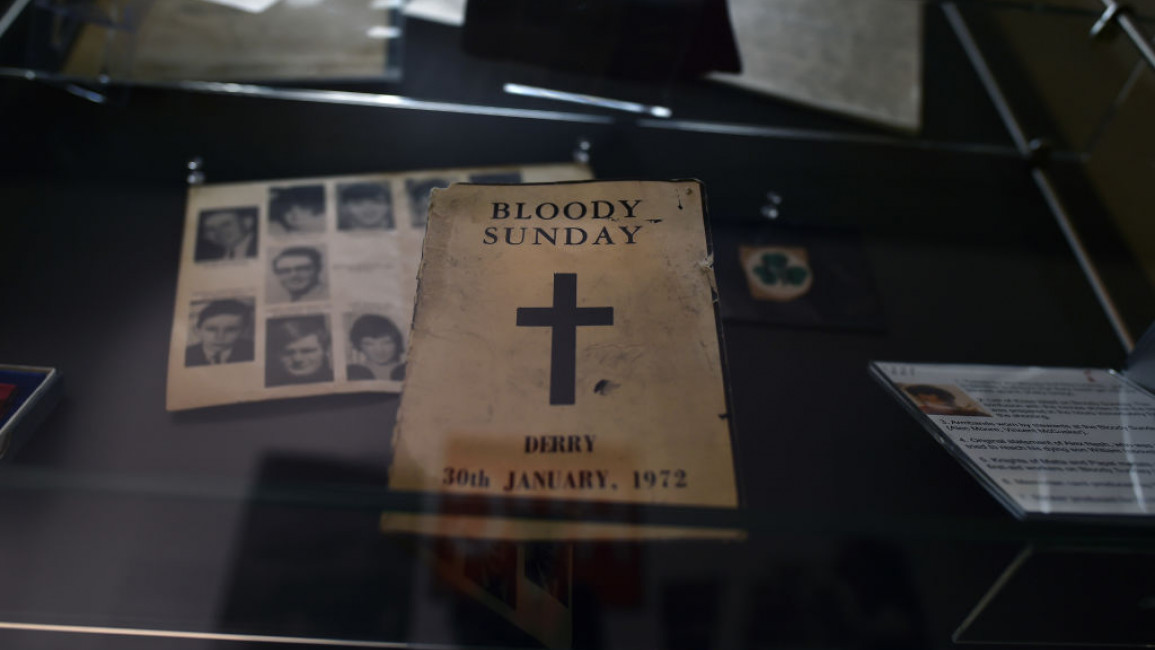Bloody Sunday: Survivors recall Northern Ireland massacre 50 years on
Denis Bradley was only 26 when he witnessed British paratroopers shoot dead 13 civilians during a rights march in Northern Ireland on Bloody Sunday.
The former priest, now in his 70s, vividly remembers his shock on 30 January 1972, when he saw the protest involving "the usual" stone-throwing turn into "a massacre".
AFP interviewed Bradley, who left the Catholic Church at the end of the 1970s, in the hours following the killings and the memories are still fresh 50 years on.
"Suddenly, I heard shooting. And that surprised me. And then a lot of people running," said Bradley, who had been in what's known to the mostly Catholic nationalist community as Derry and to the largely Protestant unionists as Londonderry for 18 months.
Then, the steely-eyed Bradley recalled, "a group of people coming with a body... a young, young man was very badly injured, and had been shot.
"I went over and knelt down beside him. And I remember trying to say a few prayers... it was complete panic, people running everywhere."
There was "very, very severe firing," he said, remembering watching the life drain out of the wounded man.
"I remember the colour of the young person's face. I remember the greyness... it is a type of colour that accompanies death."
Six of the 13 civilians shot dead without warning by British troops that day were aged 17. Another man died of his injuries a few months later.
'Terrified'
"In those days, I would have seen people dying, but I wouldn't have seen that many people dying. It was early on in the Troubles," he said referring to the three decades of bloodshed that ended with the Good Friday Agreement of 1998.
"I could see a lot of soldiers taking aim... just firing guns," from the surrounding rooftops.
"The biggest sensation was, do I go to these bodies that are laying right there or do I not?
"If I go there I'm going to be shot dead. If I don't go there, I'm not going to feel very good with myself. And I made one attempt, maybe it was a poor attempt, but I made one and someone told me don't go."
The British paratroopers were "strong looking, fierce looking, [they] terrified you really".
One soldier "continued to shoot and I don't know where he was shooting, he was just shooting."
Bradley was with a group of around 20 people being rounded up by the troops to be taken away in a lorry when they saw his priest's collar.
"I remember one of the officers saying, 'let him be, let him go'," he said.
"At that stage, I went into some kind of shock... because there are certain things that I see in photographs now, and I think, I don't remember going there, I don't remember doing that."
Bradley does remember meeting a British army chaplain after he left the scene.
"He said to me, 'are you okay?' And I said, 'I'm just, it's a massacre'. I remember those words, 'it's a massacre'. He said, 'I don't know what's happened'."
The two priests said a prayer together, "but I kept saying this word to him. I said, 'There's been a massacre.' That's kind of the last I remember really."
'He was unarmed'
Jimmy Toye was 16 at the time and remembers hearing army vehicles and the firing of high velocity bullets.
"Then people were panicking, I start to run, and people were running and pushing... one of the guys who were running, to my left, he was shot in the back," he told AFP.
"I just thought one soldier or two maybe has gone berserk," he said, remembering how the shots "kept going and going".
"They were so cruel, you know."
Father of six Barney McGuigan was shot dead by a paratrooper known as Soldier F, who had murder charges laid against him in 2019 which were dropped two years later.
"He killed him. With his hands up, his white handkerchief, and he shot him in the head... you could clearly see he was unarmed, there was no threat."
"Mr McGuigan was in front of me, I won't describe but it was... horrific."
Adam Doyle takes a look at Ireland's affinity with Palestine https://t.co/3QBaqNNoMS
— The New Arab (@The_NewArab) October 29, 2021
A British judge's 12-year investigation published in 2010 concluded that none of the victims was armed, prompting then-Prime Minister David Cameron to apologise.
The troops thought "they would teach us a lesson and they would put us down", Toye said.
"But, thankfully it had the opposite effect. The following week there was another march and there was 40,000 people out there."
Toye pointed to a monument recording the names of those who died.
"They may have killed our people on Bloody Sunday but they will live forever," he said.



